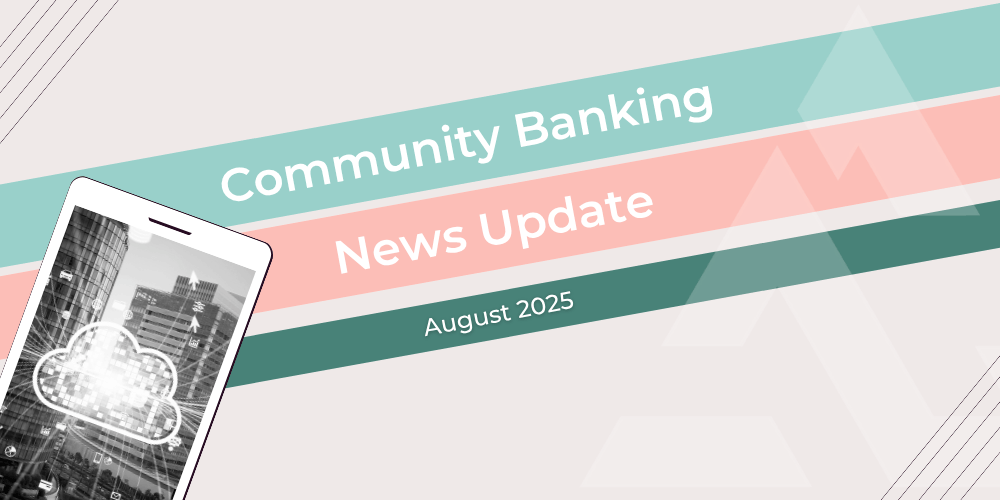The Exchange Newsletter - February 2026
This month's must-knows on bank charter momentum, ISO 20022 friction, and modern correspondent banking strategy As we move into 2026, it feels like...
5 min read
 Daisy Lin, Head of Marketing, Acceleron
:
8/6/25 10:16 AM
Daisy Lin, Head of Marketing, Acceleron
:
8/6/25 10:16 AM

Welcome to this month’s Community Banking News update, your go-to roundup of the most important news developments affecting community banks and credit unions, plus why they matter. Last month, we covered expedited bank merger reviews, crypto firms pursuit of bank charters, and new bank AI standards. (Missed it? Catch up here.)
This month’s headlines show the financial system in flux: the open banking rule may be making a comeback, major banks are deepening ties with Coinbase, traditional institutions are pushing back against crypto firms seeking bank charters, and a legal battle over ousted National Credit Union Administration board members is underway. Meanwhile, a new industry survey reveals that banks are doubling down on cloud and AI investments. What do all these developments mean for community banks and credit unions? Read on to find out.
1. Open Banking Rule Back in Play as Backlash Builds Over JPMorgan Data Fees
Federal agencies are reconsidering the fate of the CFPB’s open banking rule, which the bureau moved to vacate in May. Originally slated for repeal, the CFPB’s open banking rule — mandated under Dodd-Frank Section 1033 — was nearly shelved after the agency filed a court motion declaring the rule “unlawful” and indicating its intention to vacate it entirely.
However, JPMorgan’s recent move to implement paywalls on customer banking data triggered a strong backlash from fintech trade groups. Critics argue the fees effectively gatekeep consumer access and stifle competition, contrary to the rule’s intended purpose of fostering banking data exchange and transparency.
Now, amid growing public scrutiny and legal pressure, the CFPB has reversed course. It filed a motion to stay ongoing litigation and announced it would reopen the rulemaking process to craft a revised version of the open banking rule.
Why This Matters to Community Banks and Credit Unions:
As the CFPB re-engages with the open banking rule, community FIs have an opportunity to advocate for rules that protect consumers and promote competition without disproportionately disadvantaging smaller players in the process. On one hand, clear rules around data access could level the playing field, preventing large banks from using proprietary data strategies to lock in customers. On the other, smaller institutions may struggle with compliance costs and integration challenges if open banking mandates are reinstated without sufficient guidance or support. For community FIs, the renewed regulatory focus offers both a challenge and an opportunity to advocate for frameworks that preserve consumer choice while enabling innovation at a manageable scale.
Read more about Open Banking in our interview with the CEO of Fingoal:
JPMorgan Chase has announced a phased partnership with Coinbase that will allow customers to fund their Coinbase accounts using Chase credit cards starting this fall. Next year, customers will be able to link their Chase bank accounts to Coinbase wallets and even transfer their Ultimate Rewards points to their Coinbase account to fund their crypto wallet. Meanwhile, PNC Bank is partnering with Coinbase’s crypto-as-a-service platform to enable customers to buy, hold, and sell cryptocurrencies directly through PNC’s digital banking channels. The bank will also provide select traditional services to Coinbase, highlighting a deeper institutional collaboration.
These developments come as the Genius Act, the long-debated federal framework for regulating stablecoins, has officially been signed into law. With new rules in place for issuers, custody providers, and digital asset intermediaries, the Act provides long-awaited regulatory guidance that is likely fueling a wave of bank-crypto partnerships aimed at bringing digital assets into the regulated financial mainstream.
Why This Matters to Community Banks and Credit Unions:
These developments signal a clear shift: crypto is no longer just a fintech experiment, it’s entering the core banking experience for millions of Americans. These partnerships put pressure on smaller institutions to explore their own strategies for digital asset services, either through fintech partnerships, vendor integrations, or consortium models. While operational and regulatory challenges remain, these developments signal it’s time for community institutions to begin evaluating how digital assets might fit into their long-term strategy as customer expectations and industry standards continue to evolve.
A coalition of traditional banking organizations — including the American Bankers Association, America’s Credit Unions, the Consumer Bankers Association, Independent Community Bankers of America, and the National Bankers Association — has requested that the Office of the Comptroller of the Currency (OCC) pause review of national trust charter applications submitted by crypto firms such as Ripple, Circle, and Fidelity Digital Assets. These groups argue the public portions of these filings lack sufficient transparency and detail for meaningful scrutiny, especially considering these firms propose business models centered on digital asset custody rather than traditional fiduciary activities associated with trust banks. They contend the charters represent a fundamental departure from OCC precedent and could pose systemic risks without proper oversight
Additionally, community-focused groups including the National Community Reinvestment Coalition have objected to Circle’s application on the grounds that granting a charter could bypass critical consumer protections and undermine fair-fee regulations, potentially introducing governance and systemic safety concerns before the implementation of stablecoin rules under the GENIUS Act.
Why This Matters to Community Banks and Credit Unions:
This pushback represents a coordinated effort by traditional and community lenders to ensure that any expansion of federal bank charters into the crypto space does not undermine established oversight frameworks. For community banks and credit unions it’s a chance to reinforce the importance of fiduciary standards and transparent regulatory processes. Community FIs have a stake in shaping these evolving standards: they need to ensure that any crypto-bank entrants play by the same safety, soundness, and consumer protection rules that govern all federally chartered entities, preserving a level competitive environment and safeguarding systemic stability.
Read more about stablecoin risks:
A U.S. District Judge has ruled that President Trump’s firing of two Democratic National Credit Union Administration board members, Todd Harper (appointed 2019, term through 2027) and Tanya Otsuka (appointed 2023, term through 2029), violated statutory protections denying presidential removal without "cause." He ordered their immediate reinstatement, allowing them to briefly resume duties and attend the NCUA board meeting on July 24. However, on July 28, the D.C. Circuit Court of Appeals granted an emergency stay, preventing reinstatement while the appeal is pending. Harper and Otsuka filed responses on August 4, and urged the court to allow them to return to the board quickly. The administration’s reply is due August 11.
Why This Matters to Community Banks and Credit Unions:
The ouster of the two NCUA board members had left the agency with a single board member, eliminating the quorum required to vote on policy changes, finalize regulations, or approve enforcement actions. This effectively brought key agency functions to a standstill. For credit unions, the lack of a functioning board creates uncertainty around pending rules, supervisory actions, and strategic initiatives that directly affect day-to-day operations and long-term planning. With the legal battle over board composition still unfolding, credit unions should monitor developments closely, particularly any delays or shifts in rulemaking, examination priorities, or guidance that could impact compliance, product offerings, or member services.
Read more about Acceleron's partnership with Service Credit Union:
Over the past two years, 87% of financial services firms have increased their investment in cloud infrastructure to support scalability and AI adoption, according to a London Stock Exchange Group (LSEG) survey of 453 industry executives.
The research found that 91% of banks are leveraging cloud for use cases like data analytics, generative AI, fraud detection, and risk management. Furthermore, 82% operate in hybrid or multi-cloud environments, and LSEG executives say that running parallel environments across multiple cloud providers is an emerging practice as well, to avoid vendor lock‑in and concentration risk.
Why This Matters to Community Banks and Credit Unions:
For community financial institutions, cloud strategy is no longer just about trimming IT budgets, it’s becoming a strategic pillar in competing with larger banks on innovation and resilience. As LSEG’s survey shows, most banks now expect to run mission-critical workloads such as fraud detection and enterprise risk modeling in the cloud, powered by advanced analytics and AI. To stay competitive, smaller banks and credit unions may want to evaluate their cloud strategies with a focus on resilience and balanced oversight of costs and security.
Acceleron is a modern correspondent banking platform that empowers community banks and credit unions to automate international wire transfers, capture non-interest income, and compete more effectively with big banks. With a foreign exchange (FX) marketplace and currency conversion engine, Acceleron’s API-first infrastructure helps institutions turn cross-border payment flows into efficient, revenue-generating opportunities. Serving over 200 financial institutions and facilitating more than $1 billion in international payments annually, our correspondent banking services and international payment automation solutions are pre-integrated seamlessly with Fiserv Payments Exchange, Braid, and other leading payments platforms.
Subscribe to our monthly newsletter, "The Exchange," to stay ahead of the curve and get original content and insights you won't find anywhere else!

This month's must-knows on bank charter momentum, ISO 20022 friction, and modern correspondent banking strategy As we move into 2026, it feels like...

Key regulatory, policy, and market shifts community banks and credit unions should be watching These are extraordinary times for the banking...

Common international wire failure points and how international payment automation can reduce errors to under 1% In 1871, Western Union introduced...